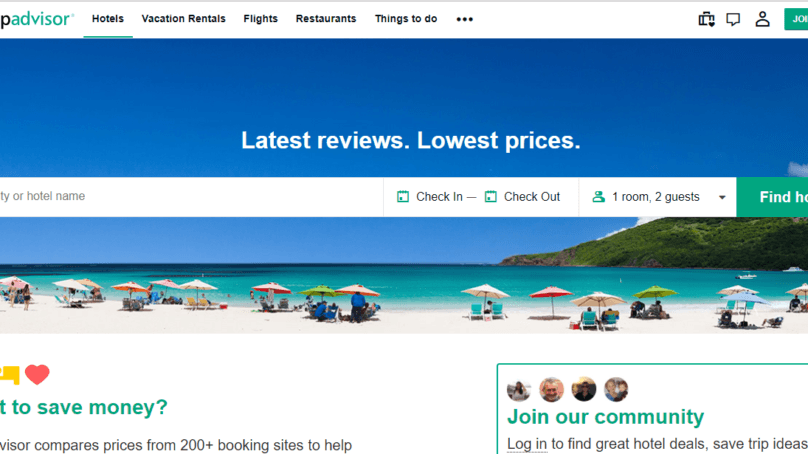
TripAdvisor has a massive influence on a USD 5 Trillion global travel economy, research shows
The travel industry reached more than USD 5.29 trillion in spending in 2017, with international tourism spend growing for the last eight consecutive years, revealed ‘Sizing the Worldwide Travel Economy’ study by Oxford Economics in partnership with TripAdvisor.
 By comparing world economic growth data with TripAdvisor’s own trends, the study was also able to show that TripAdvisor had an enormous estimated influence of USD 546 billion in 2017 alone. Globally, the popular travel site influenced more than 433 million trips last year, and 65 million in just the United States alone last year.
By comparing world economic growth data with TripAdvisor’s own trends, the study was also able to show that TripAdvisor had an enormous estimated influence of USD 546 billion in 2017 alone. Globally, the popular travel site influenced more than 433 million trips last year, and 65 million in just the United States alone last year.
“We launched this study not only because we wanted to better understand the true size and scope of the global travel economy, but also to better understand TripAdvisor’s scale and impact on tourism,” said Charlie Ballard, director of strategic insights, TripAdvisor. “The travel category is indeed enormous and outpacing other consumer spending worldwide, and TripAdvisor not only inspires travel, but also causes more travel – in particular by encouraging travelers to take longer trips by showing them how much more there is to see and do.”
Over the past 10 years according to Oxford Economics, travel-related spending influenced by TripAdvisor sites has outpaced growth in overall travel and tourism spend. TripAdvisor-influenced spend has grown at an annual average growth rate of 7.4 percent over the past decade. This compares favorably with average growth of three percent for total tourism spend. Even when total spend fell by 5.3 percent in the depths of the global recession in 2009, TripAdvisor-influenced spend outperformed the wider trend.
TripAdvisor’s influence has also risen across all global regions over the past decade – with notable improvement in both developing tourism destinations, as well as in developed markets. In fact, Oxford Economics applied sophisticated analysis to prove that TripAdvisor causes more travel, which is most evident through increased visitor nights and spending than through arrivals.
| TripAdvisor’s Global Influence and Additional, 2017 | ||||
| Trips (millions) | Nights (millions) | Spend (US billions) | ||
| Total Travel Market | Total | 4,453.7 | 18,757.1 | 5,288.5 |
| Inbound | 1,280.3 | 5,765.2 | 1,405.3 | |
| Domestic | 3,173.4 | 12,991.9 | 3,883.2 | |
| TripAdvisor Influence | Total | 433.1 | 2,236.2 | 545.7 |
| Inbound | 179.2 | 982.4 | 220.1 | |
| Domestic | 253.9 | 1,253.8 | 325.6 | |
| TripAdvisor Additional | Total | 32.2 | 502.7 | 80.3 |
| Inbound | 11.3 | 232.2 | 35.3 | |
| Domestic | 21.0 | 270.5 | 45.0 | |
The study painted a picture of a healthy and growing travel economy, with the greatest surges in travel spending over the last few years resulting from the APAC, Middle East and Latin American regions.
At USD 3.9 trillion per year, domestic tourism spend accounts for around three-quarters of global tourism spend, while international spending grew to USD 1.4 trillion in 2017.
When looking at how the travel economy breaks out by sector worldwide, a few key findings stand out, including how a piece of the total traveler economy is spent on retail sales:
| Inbound Travel | Domestic Travel | |
| Accommodation | 22.4% | 14.6% |
| Transportation | 29.3% | 34.0% |
| Recreation, culture & sports | 6.5% | 7.7% |
| Retail | 20.0% | 17.5% |
| Food & beverages services | 14.8% | 15.3% |
| Other | 7.1% | 10.8% |
While the North America travel economy has grown by +25 percent in the past 10 years, the Asia-Pacific market has grown by +130 percent. In contrast, Western European destinations have largely remained flat during this time.
| Destination region | 2017 spend (US$ trillions) | Growth 2007 – 2017 |
| Global | 5.29 | 41.9% |
| APAC | 1.89 | 130.3% |
| Middle East | 0.15 | 93.8% |
| Latin America/Caribbean | 0.28 | 42.1% |
| Africa | 0.12 | 26.4% |
| North America | 1.20 | 24.9% |
| Emerging Europe | 0.23 | 16.0% |
| Western Europe | 1.42 | 2.9% |
International travel is expected to become more important as household wealth continues to rise in large emerging markets, with a greater proportion of households able to afford international travel.
Add to Favorites














